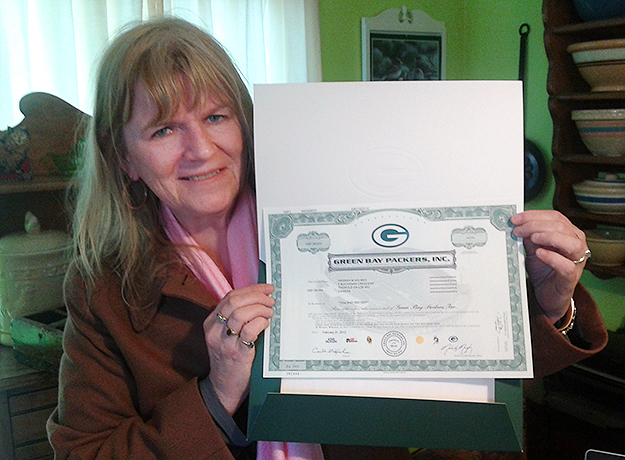From punk clubs to the post-secondary classroom

Hannah Holmes shows off her share in the Green Bay Packers football franchise. The economics assistant professor lists NFL football as one of her many interests, which also include punk rock, powerlifting and experiential learning.
Hannah Holmes isn’t just a fan of second-wave punk rock. She lived it.
Back in 1983, the St. Catharines, Ont. native plunged head-first into the turbulent Southern Ontario music scene with her band, Sixteen Again – placing her childhood love of Paul McCartney and the Beatles on hold, temporarily.
“We played regular gigs at Jerry’s Alley in the old Russell Hotel, once the punks took over from the bikers,” says Holmes, flashing a smile and leaning back in her chair. “We had our record (True Enough) played on CFNY a few times, and we also played at the El Mocambo in Toronto. There used to be a great music scene in the area.”
Reflecting on her tumultuous days in the St. Catharines underground from behind a sleek, tidy desk in Kenneth Taylor Hall, the assistant professor of economics seems worlds apart from her career as a part-time punk and full-time manager at a local record store. But then again, it takes more than a cursory glance to get a true sense of Holmes’ past.
Music may have been an early career pursuit, but Holmes continued to focus on her studies after graduating from Lakeport Secondary School in St. Catharines – earning two bachelor’s degrees from Brock University, before graduating with a MA in economics from McMaster (and later adding a second MA in politics from Brock).
The soft-spoken scholar was also a former powerlifting enthusiast, and even climbed onto the podium at the 1987 Canadian Powerlifting Championships in Vancouver, earning a silver medal in her weight class. She retired from competition soon afterward due to the physical stress, but remains an avid fan of the sport, along with several others.
Holmes’ office may be in the heart of Marauder country, but its walls and furnishings are peppered with tiny flecks of green and gold – a sign of her boundless love for the NFL’s Green Bay Packers. How much love, you ask? Back in February, Holmes and her husband purchased a $250 share in the storied franchise – one of 300,000 offered to fans as part of a special promotion. A duplicate certificate hangs proudly on her office wall. The original is tucked away safely at home.
But even with all of her diverse interests, she credits her time on stage in intimate punk clubs for instilling a true appreciation of the individual – an ethos she still applies to her research more than three decades later.
Holmes is still passionate about music, but even more so about the quality of education among the province’s undergraduates. So much so that it comprises one of her major research projects. She’s currently looking at the impact of class sizes on student outcomes.
“In order to engage a large number of students, we have to change the very nature of how we deliver course material. For many instructors, it can be very daunting,” says Holmes. “Especially when you want to reach as many people as possible.”
An added challenge is the fact that incoming students at Ontario universities are younger than ever before, and increasing numbers don’t cite English as a first language. In order to truly reach each person in the classroom, it’s become imperative to put in extra hours and make professors readily available for additional inquiries.
“The question becomes, ‘how do we make this experience less intimidating?’ It’s supposed to be engaging, challenging and fun,” says Holmes. “We have two or three times as many students in some lecture halls, but still just one instructor at the front.”
In 2007, Holmes joined the Faculty of Social Sciences’ Experiential Education Project Grants Committee – an endeavour she holds near and dear. Student Experience Grants are designed to provide financial support for student-initiated experiential learning opportunities, either on or off campus. The panel reviews proposals detailing all kinds of hands-on learning experiences, from archaeological digs to workshops and academic conferences abroad.
The latter is just as important, says Holmes, because it allows students to not only read someone’s work, but potentially meet them face-to-face and share ideas. “Undergraduates have so much to offer, and we’re starting to understand that more and more,” says Holmes.
And what does she make of all the extra time spent with students? “Teaching is not work. It’s a passion.”
